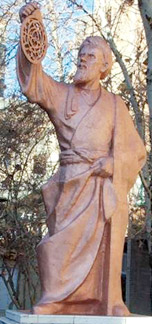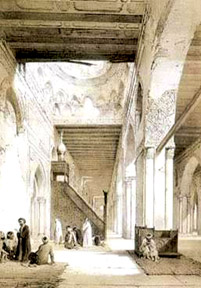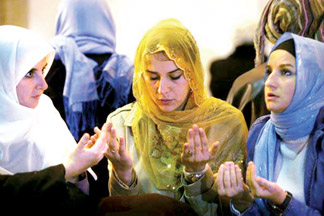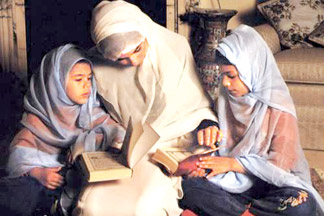ISLAM
Muslim inventions that shaped the modern world
Think of the origins of that staple of modern life, the cup of
coffee, and Italy often springs to mind. But in fact, Yemen is where the
ubiquitous brew has its true origins.
|

Ibn Firnas’s gliding machine foreground, Leonardo Da Vinci’s
at rear |
Along with the first university, and even the toothbrush, it is among
surprising Muslim inventions that have shaped the world we live in
today.
|

A French illustration from Al Zahrawi’s medical text |
The origins of these fundamental ideas and objects - the basis of
everything from the bicycle to musical scales - are the focus of 1001
Inventions, a book celebrating ‘the forgotten’ history of 1,000 years of
Muslim heritage.
“There’s a hole in our knowledge, we leap frog from the Renaissance
to the Greeks,” Chairman of the Foundation for Science, Technology and
Civilisation, and editor of the book Professor Salim al-Hassani said at
the 1001 Inventions exhibition at London’s Science Museum. Hassani said
the exhibition was aimed at highlighting the contributions of
non-Western cultures — like the Muslim empire that once covered Spain
and Portugal, Southern Italy and stretched as far as parts of China — to
present day civilization.
Here Hassani shares his top 10 outstanding Muslim inventions:
1. Surgery
Around the year 1,000, the celebrated doctor Al Zahrawi published a
1,500 page illustrated encyclopedia of surgery that was used in Europe
as a medical reference for the next 500 years. Among his many
inventions, Zahrawi discovered the use of dissolving cat gut to stitch
wounds - beforehand a second surgery had to be performed to remove
sutures. He also reportedly performed the first caesarean operation and
created the first pair of forceps.
|

Al-Khwarizmi |
2. Coffee
Now the Western world’s drink coffee, was first brewed in Yemen
around the 9th century. In its earliest days, coffee helped Sufis stay
up during late nights of devotion. Later brought to Cairo by a group of
students, the coffee buzz soon caught up in the empire. By the 13th
century it reached Turkey, but not until the 16th century did the beans
start boiling in Europe - brought to Italy by a Venetian trader.
3. Flying machine
“Abbas ibn Firnas was the first person to make a real attempt to
construct a flying machine and fly,” said Hassani. In the 9th century he
designed a winged apparatus, roughly resembling a bird costume. In his
most famous trial near Cordoba in Spain, Firnas flew upward for a few
moments, before falling to the ground and partially breaking his back.
His designs would undoubtedly have been an inspiration for famed Italian
artist and inventor Leonardo da Vinci’s hundreds of years later, said
Hassani.
|

An old picture of Tulun hospital and mosque in Cairo |
4. University
In 859 a young princess named Fatima al-Firhi founded the first
degree-granting university in Fez, Morocco. Her sister Miriam founded an
adjacent mosque and together the complex became the al-Qarawiyyin (Djemaa
el Kairaouine) Mosque and University. Still operating almost 1,200 years
later, Hassani says he hopes the center will remind people that learning
is at the core of the Islamic tradition and that the story of the al-Firhi
sisters will inspire young Muslim women around the world today.
5. Algebra
The word algebra comes from the title of a Persian mathematician’s
famous 9th century treatise Kitab al-Jabr Wa l-Mugabala which translates
roughly as The Book of Reasoning and Balancing. Built on the roots of
Greek and Hindu systems, the new algebraic order was a unifying system
for rational numbers, irrational numbers and geometrical magnitudes. The
same mathematician, Al-Khwarizmi, was also the first to introduce the
concept of raising a number to a power.
6. Optics
“Many of the most important advances in the study of optics come from
the Muslim world,” says Hassani. Around the year 1000 Ibn al-Haitham
proved that humans see objects by light reflecting off of them and
entering the eye, dismissing Euclid and Ptolemy’s theories that light
was emitted from the eye itself. This great Muslim physicist also
discovered the camera obscura phenomenon, which explains how the eye
sees images upright due to the connection between the optic nerve and
the brain.
7. Music
Muslim musicians have had a profound impact on Europe. Dating back to
Charlemagne they tried to compete with the music of Baghdad and Cordoba,
according to Hassani. Among many instruments that arrived in Europe
through the Middle East are the lute and the rahab, an ancestor of the
violin. Modern musical scales are also said to derive from the Arabic
alphabet.
8. Toothbrush
According to Hassani, Prophet Mohammed popularized the use of the
first toothbrush in around 600. Using a twig from the Meswak tree, he
cleaned his teeth and freshened his breath. Substances similar to Meswak
are used in modern toothpaste.
9. The crank
Many of the basics of modern automatics were first put to use in the
Muslim world, including the revolutionary crank-connecting rod system.
By converting rotary motion to linear motion, the crank enables the
lifting of heavy objects with relative ease. This technology, discovered
by Al-Jazari in the 12th century, exploded across the globe, leading to
everything from the bicycle to the internal combustion engine.
10. Hospitals
“Hospitals as we know them today, with wards and teaching centers,
come from 9th century Egypt,” explained Hassani. The first such medical
center was the Ahmad ibn Tulun Hospital, founded in 872 in Cairo. Tulun
hospital provided free care for anyone who needed it - a policy based on
the Muslim tradition
According to an article by Ismail Abaza The hospital that Ibn Tulun
built between 872 and 874 AD, known as a muristan, could be counted as
modern even now. One would leave their own clothes when entering it and
put on hospital garments. All food and medicines were free, and Ibn
Tulun inspected the hospital every Friday. This hospital was built
specifically for the general population, and in fact his soldiers and
guards were forbidden from its grounds.
Women in Islam :
Does Islam oppress women?
In answering this question, we must differentiate between the
teachings of Islam and the practice of some Muslims. Although some
Muslim cultures oppress women, it often reflects local customs that are
inconsistent, if not contrary to Islamic teachings. Islam expects its
adherents to uphold the rights of women, to protect their social status
and prevent their degradation in every way. Islam further holds that
women are equal to men in their origin, their humanity, their honor and
their accountability before God.
|

Sarajevo, Bosnia: Muslim women pray as they gather at Gazi
Husrev Bay’s mosque to mark the 27th night of Ramadan called
Laylat al-Qadr during Ramadhan last month |
Today, western societies have actually demoted women to sex objects.
The United States of America is one of the leading advocates of the
so-called ‘women’s liberation’ movement. Ironically, it also has one of
the highest rates of sexual assault and rape in the world. According to
an FBI report, in the year 1990, an average of 1756 rapes were commited
in the US every single day.
The idea that Islam treats women as second class citizens worth half
a man is nothing but a myth. Islam elevated the status of women over
1,400 years ago by declaring them the sisters of men, giving them the
right to education to the highest level, the right to choose a husband,
the right to end an unhappy marriage, the right to inheritance, in
general, the rights of a full citizen of the state. Not only material
and physical rights, but those of kindness and consideration are equally
specified and significant in Islamic law.
|

Indonesian Muslim girls learning Holy Quran |
Men and women are two equally important component parts of humanity,
and the rights and responsibilities of both sexes are equitable and
balanced in their totality. Roles of men and women are complementary and
collaborative. Although their obligations might differ in certain areas
of life in accordance with their basic physical and psychological
differences, each is equally accountable for their particular
responsibilities. Ignoring these differences is surely unrealistic, but
there is no reason to assume from them that one sex is either superior
or inferior to the other in any way.
Under Islamic law, when a Muslim woman gets married she does not
surrender her maiden name, but keeps her distinct identity.
In a Muslim marriage, the groom gives a dowry to the bride herself,
and not to her father. This becomes her own personal property to keep,
invest or spend, and is not subject to the dictates of any of her male
relatives. The Qur’an places on men the responsibility of protecting and
maintaining all of their female relatives. It means, as well, that a man
must provide for his wife and family even if she has money of her own.
She is not obligated to spend any of her money towards the maintenance
of her family. This relieves a woman of the need to earn a living, but
she can work if she chooses to do so or if her circumstances warrant it.
The family, like any other organization, needs order and leadership.
The Qur’an states that the husband has a “degree” of authority over his
wife, which means guardianship. It is important to note, however, that
guardianship is in no way a license to be a tyrant within the household.
Rather, it is a burden of responsibility for the husband to care
completely for his wife and children.
Islam paves the way
Disciplined individual, happy family life and stable
society:
The comprehensive teachings of Islam guides every aspect of human
life, paving the way for a disciplined individual and family life. This
in turn contributes to the creation of a disciplined society as we see
in many parts of the world.
|

At prayer |
Islam is based on five fundamental principals all of which inculcate
discipline in their own way in the day to day life of a Muslim. For
example to begin with, a Muslim firmly believes in the oneness of
Almighty God- Laailaha- and remains steadfast in that belief even during
the most testing times. From this firm belief emanates a unique mental
discipline which shapes both individual and social life.
|

Wealth |
Prayers
Then comes the daily five times compulsory prayer. These prayers
include early morning, noon, evening, dusk and night prayers. Observing
these prayers at specific times and that too in the midst of day to day
struggle to earn a living for him and the family, is once again no easy
task. Yet millions of Muslims all over the world, from the snow clad
mountainous regions of Central Asia, hot deserts in the Middle East to
Far East and the West do offer these prayers five times a day.
In the same spirit comes the annual fasting and compulsory charity
known as zakat.
Fasting from dawn to dusk even without a sip of water is something
only a highly motivated person could perform. Fasting changes the entire
lifestyle as it involves long nightly prayers with Mosques overflowing
with worshipers become common sights. Here too, only those spiritually
and mentally disciplined could endure the hardships involved and fast
which brings about a unique mental and spiritual transformation and
discipline paving the way for a disciplined society.
Materialistic world
In this materialistic world wealth is something every human being
dreams of and parting with wealth is very painful. But here too in
keeping with the Islamic teaching, Muslims give two and half percent of
their wealth to poor relatives and neighbours. This unique financial
discipline often leads to peace and harmony within families resulting in
a healthy and trouble free society.
|

Burqa illustration |
Islam’s fifth principal of performing Hajj, compulsory at least once
in lifetime on every physically and financially able Muslim, too imposes
a unique discipline. Since the early days of Islam, 14 centuries ago
Muslims of all corners of the world travelled, enduring untold hardships
and perils in the absence of even basic modern facilities to fulfill
this obligation. They performed the rituals in an extremely disciplined
manner and return home disciplined and transformed.
Islam imposes strict discipline with specific Dos and Don’ts,
covering every aspect of life and that too from the time a child is born
to the death of a person. It clearly stipulates how a child should be
brought up providing proper education and makes him or her an asset to
the society. Islam clearly emphasizes the need to get boys and girls
married in time to prevent them from violating moral codes and ensure a
healthy family and a healthy society.
There is a moral code even in married life, governing a husband and
wife. Even in the case of divorce, something permitted with great
bitterness, Islam taught us how it should be done in a manner preserving
family harmony and dignity. Here too there is discipline with rights and
privileges besides restrictions and boundaries beyond which a married
man or woman cannot step out.
To ensure moral discipline Islam attaches great importance to honesty
and integrity in all dealings including trading and the need to protect
the interest of buyers and sellers.
Islam taught financial discipline long before the present day
interest based open economy, which in fact loots the people heartlessly
appeared. Islam strictly forbid interest based economy protecting the
poor from being exploited by the wealthy as it happens all over the
world now. In fact long before socialism and communism appeared in the
last century to protect workers’ interest, Islam emphasized the need to
pay a labourer his due wage even before his sweat dries.
Dress code
Islam imposes a dress code for men and women and thus created modesty
and discipline. Over the years Muslims of all walks of life learned to
fashion their designs within the framework of this dress code. In the
same way Islam has forbidden brewing, consuming and selling of liquor
which has been the source of many evils destroyed, and still destroying
many societies.
Thus in Muslim societies liquor parties, night clubs, dinner dances,
free mixing of men and women which in turn pave the way for many family
and social problems were rather unknown as we see in many Muslim
countries. In this way Islam plays a crucial role in creating a
disciplined society.
>This disciplined life may sound very rigid and tough to many who
believe in a carefree lifestyle. But it is not so. Because in an Islamic
society this discipline at home and in the society mould the younger
generation which gets absorbed into this disciplined life style.
Thus Islam plays a very crucial role in creating a disciplined
society. |



